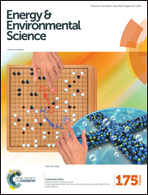Large scale computational screening and experimental discovery of novel materials for high temperature CO2 capture†
Abstract
The implementation of large-scale carbon dioxide capture and storage (CCS) is dependent on finding materials that satisfy several different criteria, the most important being minimising the energy load imposed on the power plant to run the process. The most mature CCS technology, amine scrubbing, leads to a loss of 30% of the electrical work output of the power station without capture, which is far too high for widespread deployment. High-temperature CO2 absorption looping has emerged as a technology that has the potential to deliver much lower energy penalties, but further work is needed to find and develop an optimal material. We have developed a combined computational and experimental methodology to predict new materials that should have desirable properties for CCS looping, and then select promising candidates to experimentally validate these predictions. This work not only has discovered novel materials for use in high-temperature CCS looping, but analysis of the entirety of the screening enables greater insights into new design strategies for future development.


 Please wait while we load your content...
Please wait while we load your content...